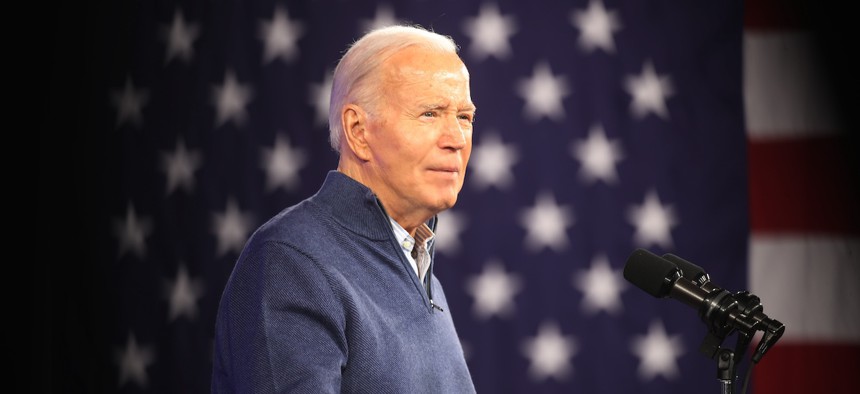
The Biden administration had previously proposed some of the largest pay increases federal workers had seen in decades. Spencer Platt/Getty Images
Biden proposes 2% raise for feds in 2025 budget
Following multiple years of multi-decade record pay increases, the White House cited “fiscal constraints” facing agencies to justify smaller raises next year.
Updated at 4pm ET
President Biden’s fiscal 2025 budget proposal, released Monday, would institute an average 2.0% pay raise for federal civilian employees next year, a significant decrease from each of the last two years.
The figure marks a departure from the president’s 2023 and 2024 budgets, which proposed some of the largest pay increases federal workers had seen in decades. The 2023 average pay raise of 4.6% was the highest since the George W. Bush administration, while this year’s 5.2% average raise marked the largest since the Carter era.
Though the White House did not specify how the raise would be split between across-the-board increases to basic pay and an average boost to locality pay, traditionally presidents have set aside 0.5% of the total figure for locality enhancements.
In a statement to Government Executive, the Office of Management and Budget said the 2025 raise figure reflects financial headwinds facing agencies, and the administration will supplement the raise with other reforms to federal personnel compensation.
“The budget includes a pay adjustment of 2.0%, building on significant increases in 2022, 2023 and 2024 while account for the fiscal constraints federal agencies face in fiscal 2025,” OMB wrote. “The administration continues to prioritize federal compensation and also looks forward to working with Congress to address long-standing issues of pay compression, which impact employees at various levels throughout the government. By continuing to pursue structural improvements and use of flexibilities, we will enhance the competitiveness of the federal pay system.”
Monday’s news received a steely reception from unions and other federal employee groups, many of whom have already signed onto a competing congressional proposal to provide federal workers a whopping 7.4% pay increase next year, 3.4% of which is devoted to locality pay boosts.
“The average 2% federal pay raise in the president’s proposed 2025 budget is unacceptable,” said National Treasury Employees Union National President Doreen Greenwald in a statement. “Federal employees are the backbone of our country yet they continue to be underpaid. Like many Americans, frontline federal workers face increasing costs that stretch their families’ budgets to the breaking point and this cannot continue. NTEU supports a fair pay increase that reflects the contributions of the federal workforce and takes meaningful steps toward closing the 27.54% pay gap between federal employees and their private sector counterparts.”
Biden’s budget also appears to do away with a longstanding Democratic priority in maintaining parity in pay increases between civilian federal employees and members of the armed services. By contrast, the president’s fiscal 2025 budget proposes a 4.5% pay raise for military service members.
“The budget funds a robust 4.5% pay raise for America’s servicemembers, continuing to build on the highest pay raise in decades of 5.2% in 2024,” the proposal states. “The budget also provides servicemembers with annual rate increases for both housing and subsistence allowances.”
Everett Kelley, national president of the American Federation of Government Employees, explicitly called out the administration for abandoning this policy.
“We are extremely disappointed in the way this budget turns it back on the longstanding practice of pay raise parity for civilian and military employees of the federal government,” he said. “A 4.5% increase for civilian workers, as requested for our colleagues in the military, would reflect the Employment Cost Index and would at least be a nod toward compliance with the Federal Employee Pay Comparability Act. Civilian federal workers right now are working for 27.5% less than their private-sector counterparts. A paltry 2% raise for civilian federal employees will do very little to close that widening gap.”
NEXT STORY: Saving for retirement







